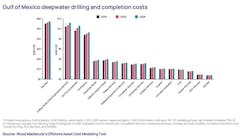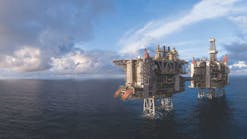Last year was tough on the offshore oil and gas industry. The BP Macondo oil spill in the Gulf of Mexico stemmed from a blowout on April 20, 2010, that resulted in the explosion of Transocean’sDeepwater Horizon and killed 11 crew.
OTC 2010 took place from May 3-6, 2010, just after the spill. Though the event reached a record attendance of 72,900 according to organizers, as offshore energy experts from around the world came together to share technological advances and innovative approaches in offshore exploration and production, the oil spill affected the mood and the tone of the event.
OTC 2010 photos courtesy of Barchfield Photography.
“We are coming together at a very sobering time for the offshore energy industry,” Susan Cunningham, 2010 OTC chairman, said. “Although we don’t yet know what caused the accident, we know that this industry takes safety and environmental stewardship very seriously. That is why when we do learn how this occurred, I know that all of us in the offshore industry will work together to prevent this from happening again anywhere in the world.”
The keynote speaker for the OTC Awards Luncheon, Noble Energy’s Chairman and CEO Charles Davidson, opened his remarks with reference to the tragic fire and sinking of the rig by saying “We’ve got to clean it up….find out what happened, and fix it so that it never happens again.”
Davidson continued, “Today’s reality is yesterday’s impossibility. Our willingness to take on the ‘impossible’ has led to immense change and success. Believing that anything is possible is critical to that success.”
OTC 2011, scheduled May 2-5, is packed with programs covering technology issues and solutions, projects, management, and HSE. However, the highest profile area will look at post-spill deepwater Gulf of Mexico operations. Other areas of interest include major projects, continuing advancements, green energy, and some new topics, too.
The technical program papers and special events highlighted below are a sample of the overall conference and are not all inclusive. An updated OTC technical program and schedule are available atwww.otcnet.org/2011.
Technical program
The most anticipated technical papers this year fall under the “Post-Spill Deepwater GoM and Beyond” canopy. Experts and government officials will look at the impacts to oil and gas drilling in the deepwater Gulf, as well as new government regulations. Risk, drilling safety, energy development, and spill response for future projects also are to be addressed.
The first of the GoM spill technical sessions is Monday afternoon. The panel will look at Offshore Energy Development through a Post Spill Reality. The moderator will be David Holt of Consumer Energy and the organizer will be Sandeep Khurana of Noble Energy. The panelists have not yet been announced at this writing.
Tuesday afternoon’s panel continues the GoM spill discussion. This time the focus is on Industry, Government, and Academic Views on Prevention and Effects. Chip Claiborne of Chevron and Greg Carter of Nautilus Offshore will moderate the panelists, who are Christopher Smith, Department of Energy deputy assistant secretary of oil and gas; Dave Payne from Chevron; Clay Vaughn from ExxonMobil; and Hanadi Rifai from the University of Houston.
Technology for Safer Deepwater Exploration continues the GoM spill discussion on Wednesday afternoon. Marcus Krekel from Exmar and Han Tiebout from SBM Offshore will chair the session. The six papers will cover managed pressure drilling, slimhole exploration wells that reduce blowout exposure, testing of BOP equipment, drilling fewer exploration wells using innovative geophysics, safer deepwater drilling with surface BOP, and mitigating borehole problems.
The final panel discussion of the Macondo incident is scheduled for Thursday morning. Navigating the New Corporate and Project Risk Environment, moderated by Chris Ross of CRA International, will look at the blowout as a new risk for IOCs. According to the program notes, the panel will discuss how risks have increased along all dimensions – political, commercial, technical, and price. If risks are indeed higher now than prior to the spill, then IOCs must convince investors and local communities that they will manage those risks differently and more effectively. The panel will gather speakers whose businesses depend on how the future risk environment evolves and who have important ideas on how to lead and manage in the new risk environment. Panelists include Susan Cunningham, Noble Energy; Chris Ross, CRA International; Jan Erik Karisen, Statoil; Richard Westney, Westney Consulting Group; and Michael Sigman, Denham Capital.
New topics
OTC is bringing new topics to the technology program this year. Enhanced Oil Recovery (EOR) will be discussed on Thursday afternoon. Jim Leavens of Soape and Associates and Barbara Thompson of Jacobs Engineering will co-chair Challenging Hydrocarbons and EOR. The seven scheduled papers cover subsurface and surface requirements for offshore chemical enhanced oil recovery, optimizing pressure differentials, high temperature fiber-optic sensors, gas and electrical heating assisted gravity drainage, wireline dual packer formation testing operations, polymer gel to control water coning in horizontal wells, and demulsifer chemical injection points using shearing energy.
Marine Archaeology is another new topic for OTC. A technical session on Wednesday morning, chaired by Kimberly Faulk of Gems, will feature seven papers. Topics include renewable energy, GoM shipwrecks, protecting submerged cultural resources, the Lophelia II wreck, AUV surveys, and legalities. A second session is planned as an alternate. If needed, Christopher Horrell of BOEMRE will oversee six papers. These papers will look at geophysics and shipwrecks, colonial-era shipwrecks, marine archaeology in Alaska, BOEMRE Historic Preservation Program, BOEMRE environmental studies program, and the T2-SE-A1 TankerS.S. Gulfstag.
On Monday afternoon catch the Deployment of Subsea Equipment program. Papers in this session will look at fiber rope in deepwater, lowering a structure to the seabed, installation of suction piles in deepwater, passive heave compensation, and lifting and towing heavy structures in the North Sea.
Tuesday morning starts with Welding Technologies for the 21st Century. Darrel Harvey from Alan C. McClure Associates and Joe Scott from Wearsox will chair this new session. The six papers target topics ranging from hardbanding drill pipe tool joints to quantitative hydrogen sensors, as well as casing centralization using spray metal technology, welding high-strength steels and corrosion-resistant alloys, and a discussion of the RP-2Z prequalification test.
Computational Fluid Dynamics will make its debut on Wednesday morning. Chairs Donald Burris, Alan C. McClure Associates, and Barbara Stone of INTECSEA will oversee the presentation of six papers. CFD modeling and thermal analysis, standardized test cell designs, flare drum carryover, prediction of dynamic hookload variations, and oil spill analysis will be discussed.
Shale gas is also a new topic at OTC this year. A panel discussion on Wednesday afternoon will examine “Global Markets the New Reality: Is it Shale and LNG, or Shale or LNG?” Bob Fryklund of IHS CERA will moderate panelists Bob Ineson of IHS CERA, Davis Thames of Cheniere, Richard Davis of Bechtel, and Emma Cochraine of ExxonMobil.
Major projects
OTC has a history of bringing major project case histories as well as management lessons to the technical sessions. Vast sums of money are spent on these projects to bring hydrocarbons to market. The seven separate technical sessions that fall under the “major projects” theme will look at advancements and lessons in managing projects from around the world.
HSE kicks off on Monday morning with six papers. Session chairs George Montgomery of J Ray McDermott Engineering and Syamal Poddar of Podder and Associates will moderate papers discussing maintaining safety standards, third-party HIL testing, shaping HSE policies, nuclear industry concepts, a case history from the North Sea, and greenhouse gas emission surveillance.
Spotlight on Major Field Development will run on Monday afternoon. Papers will cover deepwater projects in Nigeria, steel structures to artificial islands, land reclamation and artificial island technology, an injectivity test off Saudi Arabia, stochastic programming, selection methodology for various completions, and seismic imaging of a Brazilian field.
Look for Major Projects: Managing for Life on Wednesday morning. The six paper topics include mega-projects, floating platform selection, economics of complex projects, using structured project finance to reach development goals, financial impact of E&P shutdowns, and managing nontechnical risk in major projects.
Muthu Chezhian of Parker Hannifin Corp. and Dennis Schneider of Shell Intl. will chair Marginal Field and Brown Field Development and Operation on Wednesday afternoon. Subject matter experts will look at how technology enables profitability at marginal fields, new methods to design and operate surface production facilities, water management, reservoir management, a new gas/liquid separator that enhances production, Aspen field case study, and debottlenecking mature fields using full in-line-separation processing units.
A new ship shaped FPU in the GoM will highlight Thursday morning’s technical sessions. Seven papers will look at different aspects of this vessel. An overview of the FPU, as well as the steps taken to get it from conception to commissioning, and development of regulatory compliance will be discussed. Other topics include a look at a DP vessel side shell mounted disconnectable system and the analysis of risers and umbilicals for the system, design of the topsides and module to vessel interface, and the development of the Phoenix subsea field.
Thursday afternoon’s panel discussion will examine Gas to LNG: Global Trends and Projects. Buford Pollett from Eni US Operating Co. and Neil Kavanagh from Woodside Energy will serve as session chairs. According to OTC, a new wave of LNG supply is on the way from offshore gas developments in Australia, Papua/New Guinea, and surrounding waters. The panel will look at the challenges of bringing gas to shore as LNG, constructing gas liquefaction and loading facilities in remote locations, and working with local governments. OCT organizers also expect the panelists to describe the current state of play in Australian and Southeast Asia offshore gas.
Running concurrently, six papers will look at the successful Frigg decommissioning. John Barnes of AMEC Paragon and Frederic Garnaud of Total will chair this session. Subject matter experts first will give an overview of the project, and then take a look at the project from a contractor’s view. HSE, offshore work, contracting and onshore disposal will also be discussed.
Alternative energy
OTC 2011 will include technical sessions that highlight new developments in the use of alternative energy and carbon collection.
Monday morning’s panel will look at Alternative Energy: A Sustainable Energy Mix for the 21st Century and Beyond. According to OTC, five panelists will review major sources of alternative energy and discuss the benefits, technical costs, and regulatory challenges associated with each source.
Another panel on Wednesday morning will discuss Capturing Carbon Credits from Offshore Carbon Sequestration. Moderator Charles Knobloch from Arnold & Knobloch will keep the discussion flowing among panelists Elaine Darby, Anchor QEA; Keith Casto, Shook, Hardy & Bacon; Ruth Ivory-Moore, ExxonMobil; Paul Williams, Baker Hughes; and Alex Rau, Climate Wedge.
The topic of Carbon Capture Sequestration will continue on Wednesday afternoon with a technical session chaired by Syed Ali and Francois Auzerais from Schlumberger. The six papers will look at net present value of CO2 sequestration, storage of CO2, technologies for CO2 EOR/CCS projects, using uncertainty analysis to ascertain CO2 storage potential, and costs and benefits of carbon capture and storage.
Offshore Wind Energy will be the topic of two technical sessions on Thursday. The morning session will look at aerodynamic analysis methods for floating wind turbines, offshore wind turbine foundations, design considerations, safety and structural assurance, blade inspection, reliability, and support platform physics. The afternoon session will cover CO2 footprints, design challenges of wind turbine installation vessels, a comparison of installation scenarios, using a savonius rotor for offshore wind energy conversion, vertical wind turbines, installing three wind turbines on one floating unit, plus standards and third party oversight.
Continuing advancements
Attendees to OTC expect familiar topics, too. Returning features include:
- Drilling and well completions
- Floating LNG
- Flow assurance
- Pipelines, risers, and flexible pipe
- Seismic imaging
- Subsea processing.
Awards
Annually, OTC recognizes innovative technologies with the Spotlight on New Technology Award. According to OTC, the award is open only to OTC exhibitors and is designed to showcase the latest and most advanced technologies that are leading the industry into the future.
OTC awarded 13 technologies in 2010. These include:
- Aker Solutions for the MH MDDM 1000 AC
- Expro for its FlowCat Wireless Safety Valve System
- FMC Technologies for its Self Configuring MPM – Multi-Phase Meter
- Halliburton for its GeoTap IDS
- MacDermid Offshore Solutions for its Ultra High Temperature Subsea Control Fluid, Oceanic – XT900
- Rapp Hydema for its Liquid-Cooled Electric Motor
- Reelwell for its Telemetry System
- Schlumberger for its SenTURIAN Subsea Landing String Electrohydraulic Operating System, and its subC-racs
- ShawCor or its Thermotite ULTRA
- TSGROUP for the TST CFU – Compact Flotation Unit
- Wanner Engineering, Inc. for the Hyra-Cell T80 Series “Packing-Free” Triplex Plumps
- WFS for the SeaPAR.
Events and activities
OTC kicks off with its annual OTC Dinner at the George Bush Grand Ballroom in the George R Brown Convention Center on Sunday, May 1, at 6 p.m. The dinner not only provides a networking opportunity, but also raises funds to benefit the Gulf of Mexico Foundation. The mission of the Gulf of Mexico Foundation is to promote and facilitate conservation of the health and productivity of the Gulf of Mexico and its resources through education, public awareness, research, and leadership programs.
OTC will also recognize the OTC Distinguished Achievement Award recipients. These include:
Distinguished Achievement Award for Individuals: OTC is honoring Cortis (Cort) Cooper with this award for his pioneering work in metocean research and his leadership of joining industry efforts to address oceanographic challenges.
Distinguished Achievement Award for Companies, Organizations, or Institutions: OTC will acknowledge BP Norway’s life-of- field seismic reservoir surveillance project with this award. The project demonstrates the practicality of implementing seismic surveillance of producing hydrocarbon reservoirs.
Special Citation: OTC is giving this award to ExxonMobil Development Co. for the development and implementation of the “Design One, Build Multiple” philosophy to deliver major deepwater projects in Angola’s block 15.
Other events include Topical Breakfasts, which are held every morning from 7:30-9:00. Tickets are $40 each. Monday’s breakfast topics include Exploring Russia’s Energy Industry; E&P Talents: Recruiting, Development, and Retention; and Drilling Relief Wells and Dealing with Uncertainty. Tuesday’s breakfast topics include doing business in Mexico, Current Affairs in the Australian Oil and Gas Market, and Professional Ethics in Offshore Operations. Attendees have four breakfast choices on Wednesday with a focus on Malaysia, Marine Archeology, the Kuwait Oil Co., and Process Safety in Offshore Operations. To get you through the last day, fuel up with breakfast while learning about Cyprus or Global Energy Senario with Deepwater Perspective.
If breakfast does not fit your schedule, try to catch one of the Topical Lunches from 12:15 p.m. to 1:45 p.m. Monday through Thursday. Tickets are $50 each. Monday’s learning lunch choices are Saudi Aramco’s Gas Exploration and Development Program; Silicon Seafloor: Constraints that have limited the adoption of semiconductors in subsea production systems; and Next Steps in Offshore US Regulations. On Tuesday, choose from Incorporating High-Integrity Pressure Protection Systems into Subsea Systems Design; OGX: A Brazilian Company – A successful model; ExxonMobil: Researching the Fundamentals to Support Operations Integrity; Oil Spill in the GOM; and CO2 Technology Center Mongstad (TCM) at the Forefront of Innovation. On Wednesday take a mid-day break and learn about ADNOC Major Offshore Development: Opportunities and Challenges; Updated Information on the Pre-Salt Development Offshore Brazil; or Major Investments in Offshore Indonesia. Finish off the week with a luncheon discussion on Energy Geopolitics or New Technologies for Enhanced Oil Recovery.
Other activities scheduled for the week include The Next Wave on Monday from 8:15 a.m. to 2:30 p.m. Oil and Gas 2.0: Taking the Industry to the Next Level will focus on how oil and gas continues to be the fuel for the next generation. Gerald Schotman, chief technology officer for Shell will deliver the keynote address. The panel discussion will focus on positioning young professionals to take the oil and gas industry to the next level. The discussion also will look at the changing trends in the industry and how those might impact young professionals. Roundtable breakouts will allow young professionals an opportunity to discuss their own career development. Tickets are $50 each and include a continental breakfast, lunch, and evening reception in Reliant Center from 5:00 p.m.-6:30 p.m.
Though OTC week is focused on offshore oil and gas, it is nice to get away from it all for a few hours. Catch a soccer/football/footy match at Robertson Stadium on Wednesday night and cheer on the Houston Dynamo. For discounted tickets contact Casey Ellison at 713.276.7537.
Thursday morning the Energy Education Institute will sponsor two events. From 7:30 a.m. to 3:00 p.m., 100 Houston area classroom teachers will attend a free, one-day energy education workshop. High school students also will have a chance to learn more about the offshore oil and gas industry. From 8:30 a.m. to 1:30 p.m., aspiring engineers, scientists, and managers will go on a scavenger hunt of the technology exhibits and participate in hands-on energy lessons provided by the US National Energy Education Development (NEED) Project.
OTC University
OTC has invited universities to share relevant R&D projects with OTC 2011 attendees from 9:00 a.m. to 5:00 p.m. Monday through Wednesday in Reliant Center, Level 2 Foyer Area. The line-up is as follows:
Monday, May 2
- Missouri University of Science and Technology – Research Highlights and Capabilities of Missouri S&T
- National Corrosion Center at Rice University – Assessment of Corrosion; Prevention of Corrosion; Nano Membrane and Carbon Capture
- Rice University – Robotic MFL Sensor and Vibration Based Monitoring and Inspection of Deepwater Risers
- Texas A&M University, Petroleum Engineering Department – Crisman Institute for Petroleum Research Energy Engineering Institute
- University of Oklahoma – Fiber Containing Sweep Fluids for Ultra-Deepwater Drilling Applications
- University of Strathclyde – Innovative Testing Approach to Marine Current Turbines & Wave Energy Converters; VIV of Offshore Risers: Theoretical, Numerical, Experimental & CFD Approaches; Low Carbon Shipping: A Systems Approach.
Tuesday, May 3
- Missouri University of Science and Technology – Research Highlights and Capabilities of Missouri S&T
- National Corrosion Center at Rice University – Assessment of Corrosion; Prevention of Corrosion; Nano Membrane and Carbon Capture
- Rice University – Advanced Crude Oil Characterization for Modeling of Phase Behavior & Compositional Grading of Asphaltenes; Asphaltene Deposition Simulator for the Prediction of Deposition in Well Bores and Pipelines
- Texas A&M University, Petroleum Engineering Department – Crisman Institute for Petroleum Research; Energy Engineering Institute
- Texas Tech University – Early Stage Detection of Hydrate/Asphaltene Formation; Measuring Hydrate Formation/Dissolution in w/o Emulsions
- University of Strathclyde – Innovative Testing Approach to Marine Current Turbines & Wave Energy Converters; VIV of Offshore Risers: Theoretical, Numerical, Experimental & CFD Approaches; Low Carbon Shipping: A Systems Approach.
Wednesday, May 4
- Rice University – Advanced Crude Oil Characterization for Modeling of Phase Behavior & Compositional Grading of Asphaltenes; Asphaltene Deposition Simulator for the Prediction of Deposition in Well Bores and Pipelines
- Texas Tech University – Early Stage Detection of Hydrate/Asphaltene Formation; Measuring Hydrate Formation/Dissolution in w/o Emulsions.
Offshore Articles Archives
View Oil and Gas Articles on PennEnergy.com






